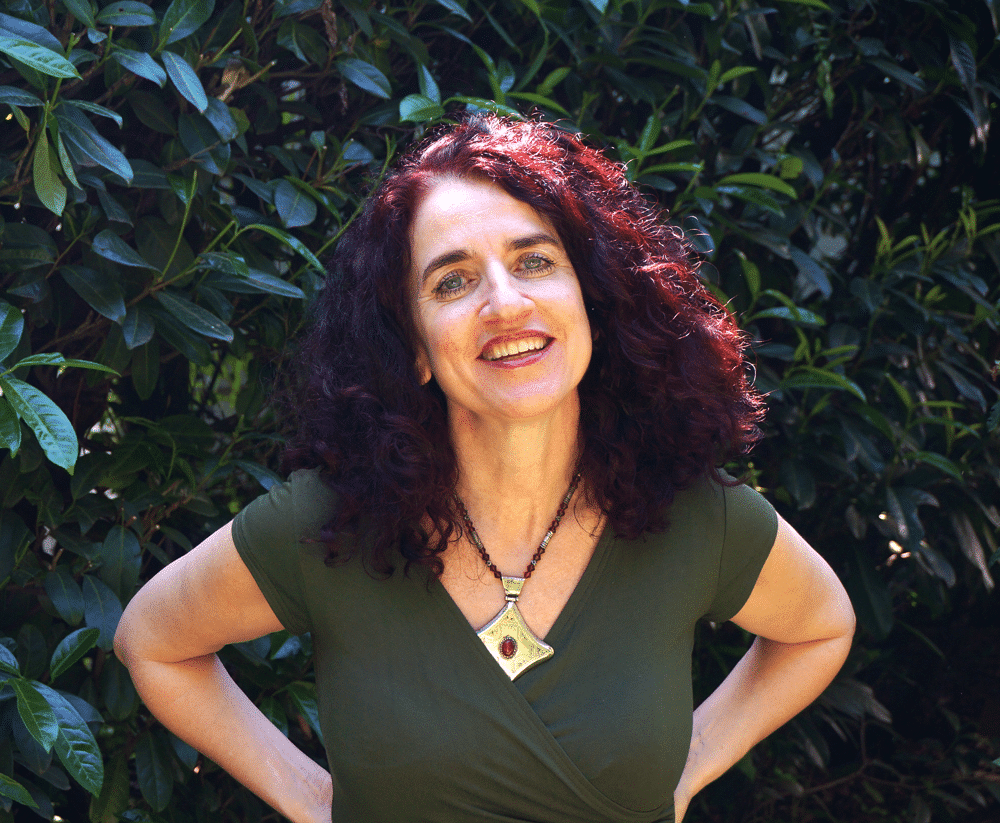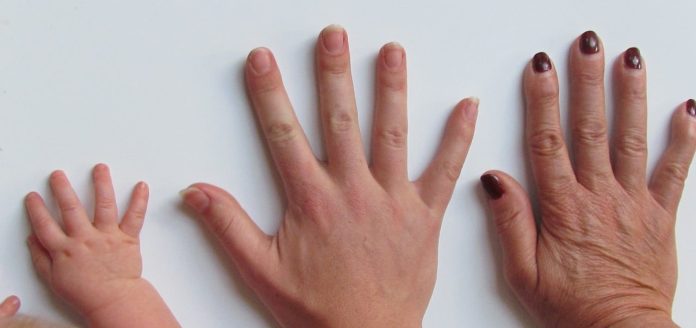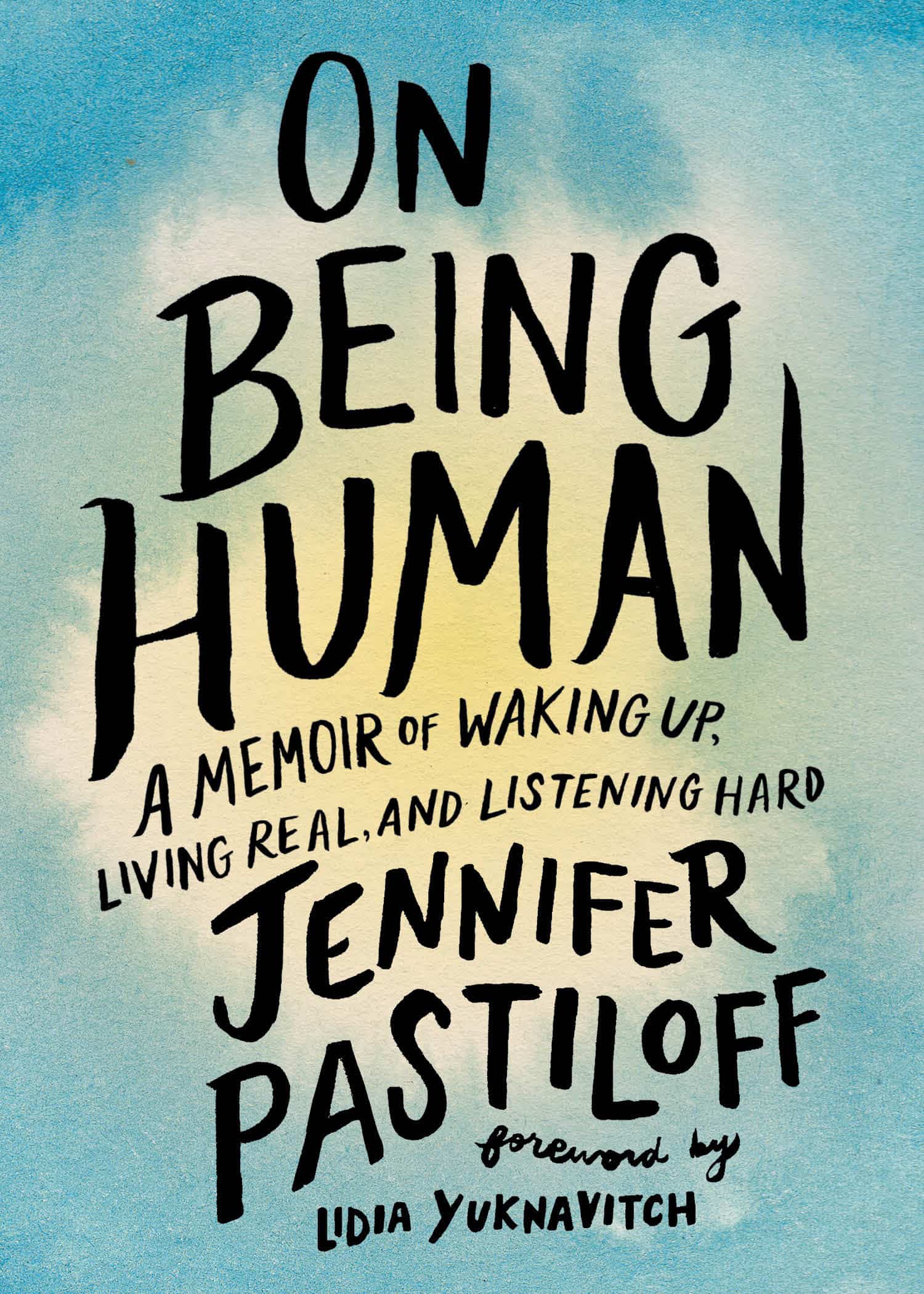By Niyati Evers
My mother discovered she was ill a few months after I was born. The way the story was told to me many years later, my mother had sat down in her favorite lounge chair in our living room and by the time she got up, the entire chair was covered in blood and poop. She’d been too ill to look after me, too sick to breastfeed me, too weak to hold me in her arms. A few months after my birth, while my mother was in and out of the hospital and my father was working full time to provide for our family, it was my Nana who mostly took care of me.
My older brother and sister were teenagers by the time my mother died. I was the toddler who’d been left behind. A toddler with the same dark hair and the same light blue eyes as the daughter Nana had lost. Because Nana had been my surrogate mum so soon after I’d been born, when Nana lost her husband and her only child, I was all Nana had left in the world. Nana lived to be with me and I lived to be with Nana.
There was a short gravel road that led from our backyard to Nana’s back garden, so short it only took a minute to walk from our house to Nana’s. I spent time with Nana almost every day of the week but each time I went to see her I was so overcome with excitement I did not walk but ran as fast as I could. Even if I stumbled and fell and my knees were covered in little gravel stones I just got right back up and I didn’t cry because I knew that in just a few seconds I’d be back with Nana.
As soon as I opened the back gate, there was Nana sitting in her garden chair, her eyes lit up in bright blue sparkles the second she saw me.
It’s as if there’s an invisible line in my brain, separating the memory of my mother from the memories I have of Nana. My mother’s memory appears to me as a black hole of nothingness. Memories of Nana on the other hand, are a stream of endless pictures that make me smile even now, as I think back to our time together.
Nana had silver hair and piercing blue eyes, eyes so intense they could scare people away, but when I sat on Nana’s lap, all I saw in her eyes was an ocean of love and sweetness. Nana and I had this game where I’d comb Nana’s silver strands of hair with a tiny black comb but instead of combing her hair back, the way it should be, I teased Nana by combing her hair right over her face. This made me giggle so much I nearly fell of her lap but Nana put her arms around me so I wouldn’t fall and she just giggled with me, silver threads of hair spread all over her face.
My mother’s second name had been Rose and maybe this was the reason Nana had planted roses of all colors in her garden, so she could remember her daughter every time she inhaled the sweet rose perfume. I did not know my mother was called Rose but I too loved smelling Nana’s roses. I’d run from bush to bush, sticking my nose into the different colored roses, noticing how each color had it’s own distinct scent. The yellow roses smelled like toffee melting in your mouth, the red ones were sweet like honey and the white ones had a fragrance so subtle it reminded me of the freshness of a soft summer breeze caressing my skin.
In the corner of her garden, Nana planted strawberries, which she knew were my favorites. Nana told me bright red meant super sweet and however much I loved strawberries, I had to be patient. One time when Nana wasn’t watching I secretly pulled a yellowish green berry off the stem and of course Nana had been right, the taste was so awful I quick spat it out into the bushes while Nana still had her back turned to me. It took all year for the berries to ripen but come the middle of summer, I was allowed to pick the darkest ones off the stem, as many as I could fit into the palm of my hand. I stood next to Nana in the kitchen as she rinsed the berries, licking little bits and pieces of strawberry off my stained palm.
Nana and I had a little ritual for the first berry. I had to close my eyes and open my mouth because Nana said that way the berries taste even better. As I stood there trying to keep my eyes shut tight and not sneak a peak at the delicious red color, Nana placed the strawberry onto my tongue and I felt the berry dissolve slowly in my mouth. And I knew that Nana was right because there was so much sweetness melting all over my tongue it gave me goose bumps and made me hum aloud with pleasure.
Summer was also the time that Nana would put a big blanket out for me in the garden where I’d lay for hours, looking up at the clouds in the sky, picturing elegant cloud women with feather hats and fierce dragons with wide-open mouths biting into other clouds and thin elongated snakes curving against the backdrop of all that blue sky. I was fascinated with the way the clouds would come together and move apart; how they would reach for each other with long stretched out fingers, trying to stay together but always forced to separate.
Nana never spoke to me about her life in Germany except for once, when she heard me talking out loud to myself about all the different creatures I saw in the clouds. Nana told me when she was a little girl she lived in a city called Augsburg where her parents owned an orchard with pear and apple trees. Just like me, Nana said, she too would lie on her back in her parents’ orchard, looking at the sky above picturing swans with long necks and sharks with sweeping tails in the ever-changing shapes of the clouds. That was the only story Nana ever shared with me about her life in Germany before she and Opa and my mother fled to Amsterdam in 1933.
When Nana cooked dinner for us, usually some dish from her home country like wiener schnitzel and baked potatoes, I sat in Nana’s living room. On the wooden dresser was a black and white photo of my dead mother, and next to that, a record player. I listened to a scratchy vinyl recording of Pippi Longstocking stories while Nana cooked and the kitchen filled with steam and flavors.
Pippi was my hero because even though Pippi’s mother had also died, Pippi was always happy and scared of nothing and no one. While Pippi was talking about her captain father and how he’d been captured by pirates, I sucked my thumb and stared at the photo of my mother. She had short dark curly hair just like my hair, except her hair was brushed back behind her ears which made her features stand out even more, her thick dark eyebrows, her high cheekbones, her full dark lips. She had a faraway look in her light-colored eyes, the same color as my eyes. Her skin the same porcelain white as my skin. A beaded necklace around her long neck, chunky flower-shaped earrings in her earlobes, a stylish jacket wrapped around her shoulders. Even though I could not stop looking at the picture, I did not recognize the woman in the photo as my mother.
After dinner, I sat on Nana’s lap while she read me my other favorite story; a fairy tale by Hans Christian Andersen called “The Little Match Girl.” The story was about a cold and hungry little girl who sold matches on the streets on Christmas Eve. The part that always made me cry was when the little girl sees a family sitting around a glorious Christmas dinner. They were so happy together, and warm, and they had so much food and the little girl was standing outside, shivering from the cold. But then the little girl starts lighting her matches to keep warm and as she lights her last match, her dead grandmother calls out to her and even though the little girl freezes to death, she is reunited forever with her beloved granny. I felt that if Nana were ever to die, I would want her to do the same for me. To come back to earth and fetch me so we could be together again.
At night, I slept in Nana’s bedroom, on a cot right next to Nana’s bed. Nana’s bedroom was upstairs, next to the room with the dark brown closet where Nana kept her fur coats and her long skirts. Sometimes when Nana opened the doors to her closet, we could see tiny little insects fly out of the closet into the room. Nana said they were moths and that they ate her clothes, which is why she put little white balls into her closets, which moths hate. The little white balls had a strong pungent scent and even as I was lying on the cot next to Nana’s bed, I could smell whiffs of it drifting through the bedroom.
From my cot upstairs I listened to the sounds of Nana, roaming around the kitchen and the living room, washing dishes. The scraping sound of Nana’s chair on the floor, sounds of Nana switching on her TV, Nana walking to the bathroom, Nana flushing the toilet. The sounds made me feel safe. As long as I heard sounds, it meant that Nana was not dead.
In the mornings when I woke up, Nana folded her covers to the side and I was allowed to crawl into bed with her. Nana’s bed was full of crumbs, not from food but from Nana’s legs. Nana said it was because she was old and that sometimes with old people their skin peels off during the night.
Before going to sleep, Nana would put her false teeth in a glass on her bedside table, which meant that Nana’s morning smile was a gaping hole with no teeth, which made me giggle a lot. And just like when I combed Nana’s hair all over her face, Nana just laughed with me, all gums and no tooth.
Nana’s toothless smile, the crumbs in her bed, the smell of mothballs, it was all Nana and I loved everything Nana.
Nana was my home.
Everything changed when Dad found me a new mum. Her name was Shelley and Dad started dating her a few months after my mother’s death. On the days that Shelley came over to visit us, when Dad put me into my crib for my afternoon nap, his dark eyes sparkled.
“When you wake up, Shelley will be here to come and fetch you,” Dad said, as he pulled up the sheets and tucked me under.
I hated those afternoon naps. Afternoon naps were for babies. I was four years old.
As soon as Dad left the room, I stood upright holding onto the railings, listening for the sound of Shelley’s voice downstairs, waiting for her to walk up the stairs, open my bedroom door and lift me out of my crib. I knew that Shelley would come to rescue me. Even if Shelley arrived shortly after Dad had put me to bed, I could hear Shelley tell Dad downstairs, I’m just going to check if she’s asleep. Shelley understood I was too old for afternoon naps.
Everything felt lighter when Shelley was around. The sparkles in her soft blue eyes, the pink shimmer of her soft round cheeks, the gold glow of her short blonde hair, the sweetness of her voice. Whenever Shelley was in the house, Dad smiled a lot and he was happy so I was happy too. Shelley’s presence was a fresh breeze that brought the oxygen back into our home.
When I told Nana that Dad had brought me a new mum, Nana’s face flushed bright red, as red as the strawberries she grew for me in the summer. I’d never seen Nana’s face that red and I’d never seen her blue eyes so narrow and so wet. Nana was always soft and sweet with me but that day, when I told her Dad had found me a new mama, Nana lifted me off the ground so fast and squeezed me to her chest so hard, it made my whole body hurt. Nana had long ago stopped lifting me up into her arms, but that day, Nana carried me to the dresser and pointed at my mother’s black and white photograph.
“This is your mother,” Nana said. She squeezed the words out one by one, like she was struggling to talk, like the words were fighting to stay inside of her, to not come out of her mouth.
“This. Is. Your. Mother.” Nana repeated the words, her finger shaking in the air as she kept pointing at the picture. I stared at the black and white photograph. The dreamy look in my mother’s eyes, her full lips that looked like they were painted onto the white of her skin with a fine pencil, the shape of her long slim nose, her short dark curly hair. She looked like the woman in the candy store where Nana bought me chocolates wrapped in gold paper. Nana said that the golden chocolates were almost as good as the chocolates she used to eat when she was a little girl back in Germany.
“No one else can be your mother,” Nana said, speaking fast now, pushing the words out of her mouth, her voice sharp in a way that made me so scared I wanted to hide my face in Nana’s chest and not look at my mother’s picture. But I knew that would make Nana’s face even redder and her voice even angrier.
“She carried you in her body,” Nana said. “She gave birth to you. No one else will love you the way she loved you.”
Nana held me close to her with her one arm and with her other hand she took the photograph of the dresser, held it right in front of my face, called me by my nickname, the name dad called me when he wished me good night, the name him and my mother had probably created for me together. “Little Lion”, Nana said, her voice softer now, her eyes big and blue and wet like never before, “don’t ever forget your real mother. You have only one mother. No one else can be your mother.”
From that day onwards, every time the school bus dropped me off at Nana’s home after kindergarten, Nana repeated the same ritual with me. The black and white photograph of the woman I did not know. Nana’s urgent voice, the pierce of her pale blue eyes, her words an ever repeating mantra in my head.
“Don’t ever forget your real mother.”
“No one else.”
Only. One. Mother.

Niyati Evers grew up in Amsterdam as part of the “second generation” of Holocaust survivors. In 1998, she moved to post-Apartheid South Africa where she lived for 14 years, working with race and gender dynamics in the workplace. Niyati now lives in Portland, OR, where together with her partner Robert, they have a sex-positive therapy practice called Alchemy of Eros, with a special focus on working with intimacy, sexuality, relationships and big life transitions. Their practice is both face-to-face as well as across the US and internationally via video conferencing. With the help of her wonderful coach Liz Asch Greenhill, she is working on a book about the quest for her own identity in the face of loss and the ripple effects of war and persecution; a quest that starts in Amsterdam, takes her to India and South Africa and finally back to Amsterdam where she begins to unravel the secrets hidden by the scars of war and discover the answers to the questions that haunted her throughout her life.
Jen’s book ON BEING HUMAN is available for pre-order here.



Dear Niyati, thank you for sharing the push and pull of this part of your story, your grandmother’s sotry and your mother’s story. I can only imagine the desperation and fear, or maybe determination and passion, your grandmother felt at the thought of her loss and yours should life take you away from the mother you barely knew and into the arms of another. I can feel your grandmother’s strenght and deep love for you. What a blessing!